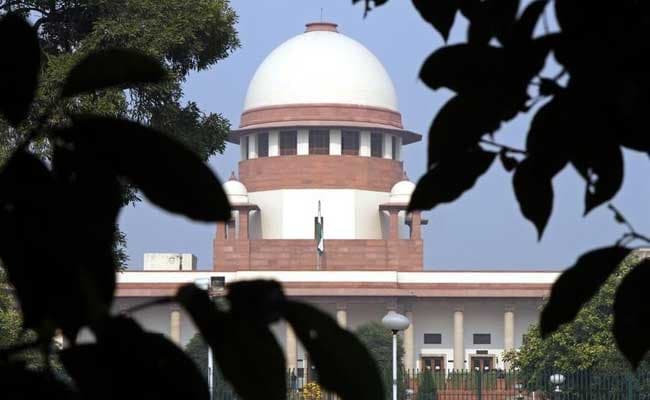
New Delhi:
The Centre on Wednesday defended army operations in the northeast and Jammu and Kashmir, and told the Supreme Court that India was faced with a war-like situation which was not akin to inter-country conventional war.
"What we are facing in the northeast or in Jammu and Kashmir, it is not a law and order situation or interval disturbance. It is an insurgency from across the border in collaboration with home-grown groups," Attorney General Mukul Rohatgi told the bench of Justice Madan B. Lokur and Justice Uday Umesh Lalit.
Pointing out that some groups engaged in armed insurgency, observe the day when Manipur became a part of India as "black day", Mr Rohatgi defending the army action in dealing with these insurgents, saying: "It is a constant war like situation."
Referring to the "amazing" number of security personnel killed in anti-insurgency operations, he said "we (security forces) don't have a first strike option" in engaging the insurgents.
The Centre said this during a hearing of a PIL by the Extra Judicial Execution Victim Families Association (EJEVFA) seeking action against security personnel involved in alleged staged shootouts in Manipur.
The petitioner contended that during May, 1979 to May, 2012, at least 1,528 people were killed in Manipur in extra-judicial executions.
Mr Rohatgi said: "When we deal with army, it is a different cup of tea compared to routine police. Army is a different organisation, it has its own discipline. It has its own rigour."
Pointing out that the rights of an army officer under the constitution were not the same as that of a common man, Mr Rohatgi said: "If I (army officer) don't do what I am supposed to do, to apprehend and shoot (the enemy), then I attract death."
Drawing the attention of the court to the flaws in the Justice Santosh Hegde Commission report that inquired into the truth of alleged stage shootout cases in Manipur, the Attorney General said most of the queries related to normal police investigation into a crime case.
He wondered how could there be questions posed by the commission as to how many bullets were fired by the army, what about collection of empty shells, if insurgent was alone and army personnel were four, then why was he not apprehended alive.
"It is either him (insurgent) or me (army personnel). You are dealing with a person who is not peaceful, who wants to overthrow the government. It is a rebellion by a 25, 30 or 100 groups, some are banned and some are not banned," Mr Rohatgi told the court.
The commission headed by Justice Hegde and comprising former chief election commissioner JM Lyngdoh and former Karnataka DGP Ajay Kumar Singh as its members was appointed by the top court on January 4, 2013.
The commission was mandated to go into the truth of the allegations concerning the instance of alleged extra judicial execution and record a finding about the past antecedents of the victims and the circumstances in which they were killed.
"What we are facing in the northeast or in Jammu and Kashmir, it is not a law and order situation or interval disturbance. It is an insurgency from across the border in collaboration with home-grown groups," Attorney General Mukul Rohatgi told the bench of Justice Madan B. Lokur and Justice Uday Umesh Lalit.
Pointing out that some groups engaged in armed insurgency, observe the day when Manipur became a part of India as "black day", Mr Rohatgi defending the army action in dealing with these insurgents, saying: "It is a constant war like situation."
Referring to the "amazing" number of security personnel killed in anti-insurgency operations, he said "we (security forces) don't have a first strike option" in engaging the insurgents.
The Centre said this during a hearing of a PIL by the Extra Judicial Execution Victim Families Association (EJEVFA) seeking action against security personnel involved in alleged staged shootouts in Manipur.
The petitioner contended that during May, 1979 to May, 2012, at least 1,528 people were killed in Manipur in extra-judicial executions.
Mr Rohatgi said: "When we deal with army, it is a different cup of tea compared to routine police. Army is a different organisation, it has its own discipline. It has its own rigour."
Pointing out that the rights of an army officer under the constitution were not the same as that of a common man, Mr Rohatgi said: "If I (army officer) don't do what I am supposed to do, to apprehend and shoot (the enemy), then I attract death."
Drawing the attention of the court to the flaws in the Justice Santosh Hegde Commission report that inquired into the truth of alleged stage shootout cases in Manipur, the Attorney General said most of the queries related to normal police investigation into a crime case.
He wondered how could there be questions posed by the commission as to how many bullets were fired by the army, what about collection of empty shells, if insurgent was alone and army personnel were four, then why was he not apprehended alive.
"It is either him (insurgent) or me (army personnel). You are dealing with a person who is not peaceful, who wants to overthrow the government. It is a rebellion by a 25, 30 or 100 groups, some are banned and some are not banned," Mr Rohatgi told the court.
The commission headed by Justice Hegde and comprising former chief election commissioner JM Lyngdoh and former Karnataka DGP Ajay Kumar Singh as its members was appointed by the top court on January 4, 2013.
The commission was mandated to go into the truth of the allegations concerning the instance of alleged extra judicial execution and record a finding about the past antecedents of the victims and the circumstances in which they were killed.
Track Latest News Live on NDTV.com and get news updates from India and around the world

